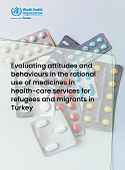Evaluating attitudes and behaviours in the rational use of medicines in health-care services for refugees and migrants in Turkey (2021)

Download
Rational use of medicines (RUM) requires that “patients receive medications appropriate to their clinical needs, indoses that meet their own individual requirements, for an adequate period of time, and at the lowest cost to themand their community”.
While physicians and pharmacists can help patients to understand and use medicationsproperly, cultural and linguistic barriers, especially in migrant and refugee situations, poor health literacy, and healthcare workers’ attitudes and behaviours may affect RUM.
This mixed study was conducted to evaluate attitudes and behaviours with respect to RUM in health-care services for refugees and migrants in Turkey. Physicians, pharmacists and patients participated in surveys, focus group discussions and in-depth interviews in May–October 2020. While most of the physicians (92.5%) and pharmacists (68.3%) stated that they informed their patients about RUM, patients expressed a need for more information about medicines and prescriptions. Both pharmacists and physicians reported that there was high patient demand for antibiotics.
Cultural and linguistic barriers at pharmacy level, compatibility issues affecting different electronic medical recording systems, especially in migrant health centres (MHCs), and a communication gap between physicians and pharmacists were the main issues affecting pharmaceutical services (with a likely impact on RUM) for migrants and refugees in Turkey.
Health-care services could be enhanced and RUM improved by giving health-care workers in MHCs and pharmacists regular training on good pharmaceutical care, promoting the use of language-appropriate visual information materials in patient consultations, providing public health education on RUM, and bridging the communication gap between pharmacists and physicians.



